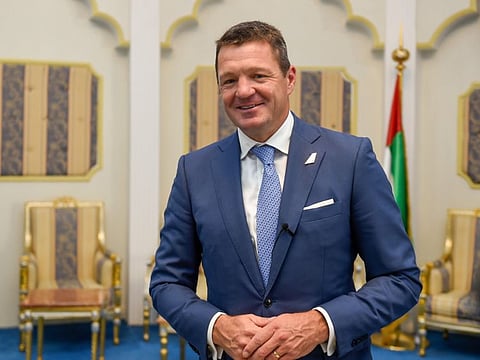Watch: Indian budget airline IndiGo is ready to chase new frontiers: CEO Pieter Elbers
"New airlines and intense competition will only lift flier experience," says IndiGo chief

Dubai: For India’s airlines, the action on the ground is getting to be as intense as the competition in the skies. New carriers have joined the race for market share, while existing players are adding new destinations - within India and outside - to throttle their way back into growth - and profitability.
Indeed, there is a lot of catching up to do as demand for travel in the country keeps gaining on a near monthly basis. Which is why IndiGo, the budget-focussed airline, places a lot of stores on reaching its 100th destination, with a flight touch down in Ras Al Khaimah earlier this week.
“If we look at the percentage of air travel in India today against the population, it’s still relatively limited,” said Pieter Elbers, who recently took over as CEO at IndiGo.
Brand new Akasa Air and a revived Jet Airways are in the fray, while Vistara, another relatively new entrant, is slowly gaining market share, and holds just over 10 per cent of the domestic passenger share. Along with a resurgent Air India and AirAsia, Vistara represents the three airlines in the Tata Group and could increase their combined share to 30 per cent in the next five years in the domestic market.
Meanwhile, SpiceJet – one of IndiGo’s primary competitors – has cut its capacity after the Directorate-General of Civil Aviation (DGCA) ordered it to operate only 50 per cent of its flights for eight weeks. The regulator recently extended the cap till October 29.
Rivalry is good
“Competition is creating higher service standards and better access to the markets,” said Elbers. “We welcome competition as we think it’s a good thing that India is moving forward in that respect, and we’ll just compete.”
IndiGo’s CEO believes there is enough and more space for everybody and wants to create the airline’s ‘own niche’. “We want to offer the right service and right level of experience and (then) let the customers decide,” he said.
Ambitious expansion
IndiGo is investing heavily to gain a larger market share in new destinations. “It’s our ambition to go to a larger share. We are building on that and then we will see to it that we retain that position over time.”
Losses at IndiGo’s holding company, InterGlobe Aviation Ltd, narrowed 67 per cent from Rs31.74 billion a year ago to Rs10.64 billion. “First quarter (April-June) of fiscal year 2022-23 witnessed the strongest revenue performance, resulting in the highest ever quarterly revenue of Rs130.18 billion,” the airline had said in an earlier statement. But “headwinds caused by a depreciating rupee and higher fuel prices led to a net loss of Rs10.64 billion for the quarter ended June 2022.”
“In terms of revenue, we were higher than where we were before, and also we see a quick return of customers,” the CEO, who was on board the flight to Ras Al Khaimah, said. “Today we’re slightly higher in terms of flight and customer numbers, compared to the pandemic levels.
Our ambition clearly is to further build on that as traffic is really coming back - very - quickly after Covid.
“Our foundation is what we do in India is we continue to add more destinations. Having that in place it’s now time to broaden our horizons.” Which explains the Ras Al Khaimah services and plans to add more to the Gulf network.
Cost factor
About battling inflationary pressures, Elbers said that the airline will ‘continue to adjust its operation’ accordingly. “We see prices going up, especially the fuel, and that to some extent has to be reflected in the fares, which we do so, as inflation is affecting us. And we will continue to adjust our operation to that.”
IndiGo is facing supply chain constraints that resulted in delays in the delivery of aircraft and engines. Yet, the airline plans to deploy 13 per cent higher capacity than the pre-pandemic period in their 2022-23 financial year.
Now, with international expansion, connecting the Indian diaspora heavy markets with a wide-body fleet is key for IndiGo. Elbers said, “We are closely coordinating with our suppliers of aircraft engines to make sure whatever we ordered will be coming in on time. It’s very important.
“We have ambitious growth plans to move forward, so we are in close contact with suppliers of engines and planes to facilitate our growth.”
Peiter Elbers settles in at IndiGo
Peiter Elbers replaced Ronojoy Dutta as Indigo’s CEO on September 6. Elbers was CEO of KLM Royal Dutch Airlines since 2014. The 52-year-old is also a member of the executive committee of the Air France – KLM Group. Elbers had started his career in 1992 with KLM and, over the past three decades, held several managerial positions in the company in the Netherlands as well as in Japan, Greece and Italy.
Sign up for the Daily Briefing
Get the latest news and updates straight to your inbox



